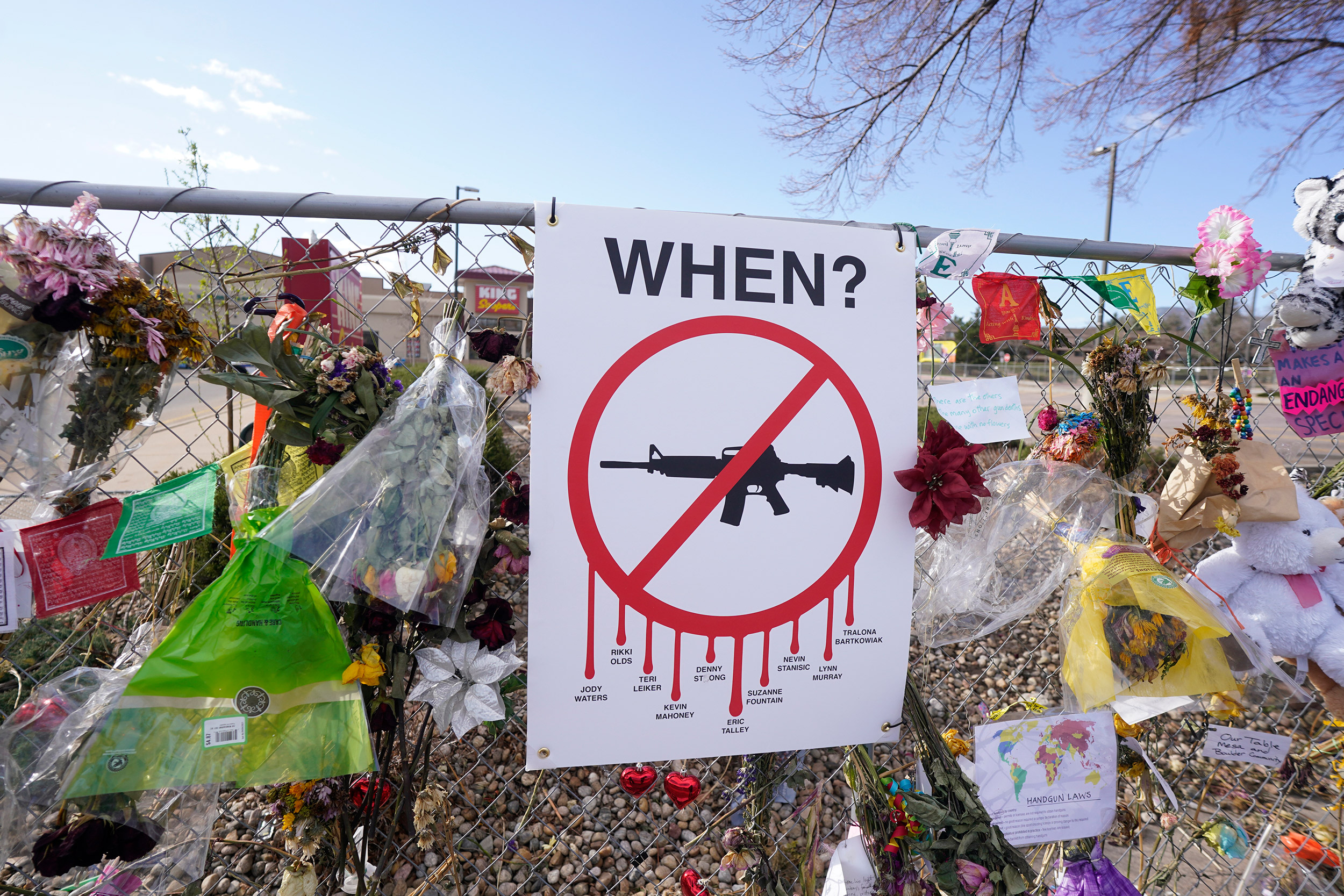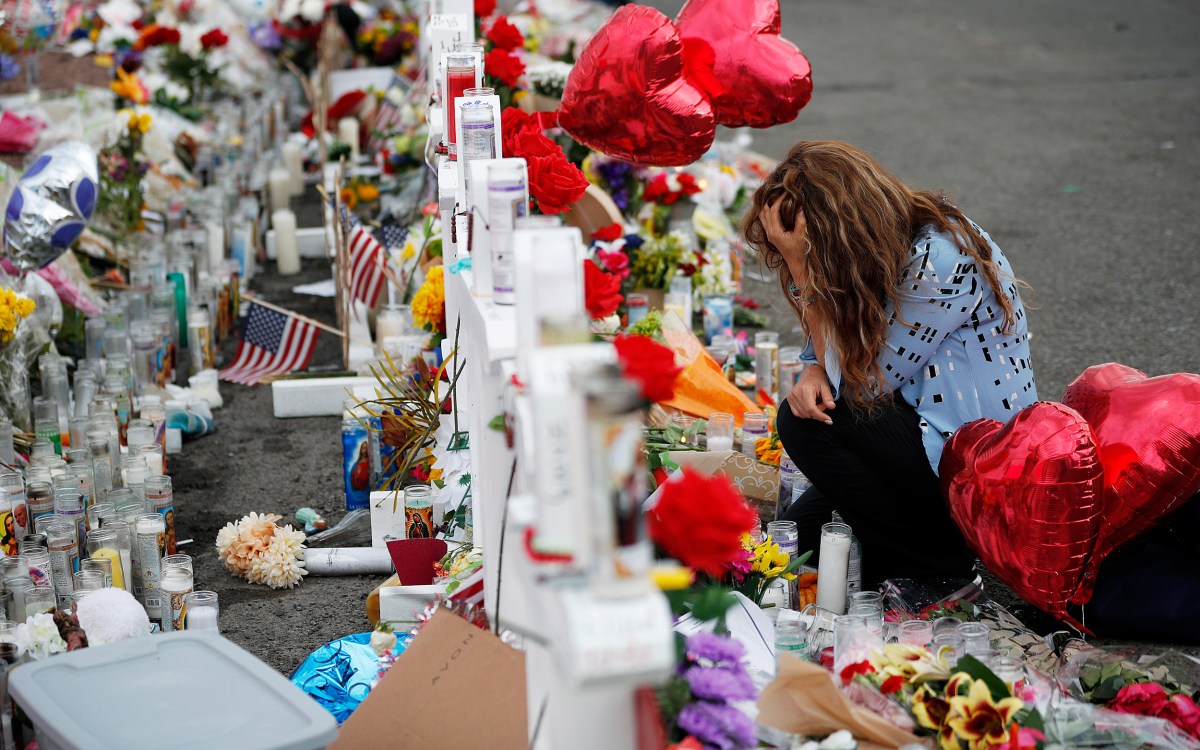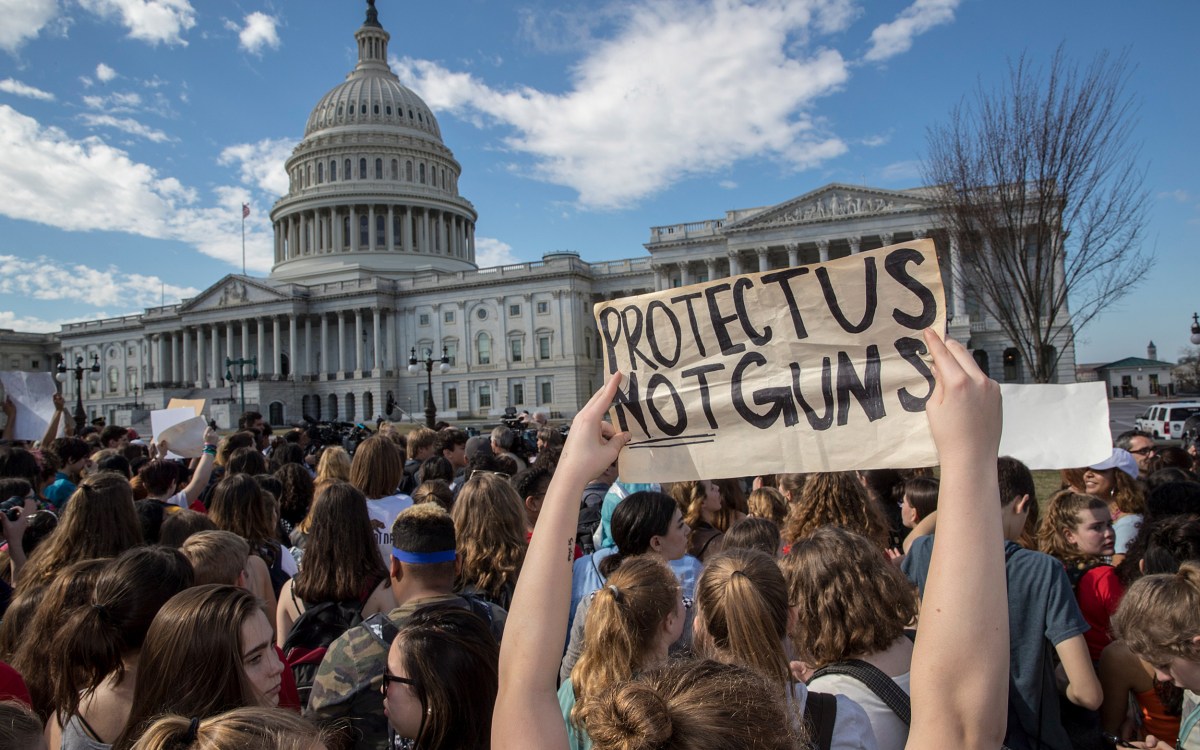
Tributes hang on the temporary fence surrounding the parking lot in front of a King Soopers grocery store in which 10 people died in a late March mass shooting.
AP Photo/David Zalubowski
Curbing gun violence in the United States
Public health expert calls Biden’s orders ‘good first steps’
In the wake of several deadly mass shootings, President Biden announced a list of executive orders last Thursday aimed at reducing gun-related violence, and called for Congress to ban assault weapons and high-capacity magazines. Biden’s orders included better regulation of “ghost guns” — homemade weapons that lack traceable serial numbers — and stabilizing braces that transform pistols into more lethal, short-barreled rifles. They also called for increased support for violence-intervention programs, and model “red flag” legislation to make it easier to get guns away from people who pose a danger to themselves or others.
Stopping gun violence will take myriad approaches, including a range of public health efforts, according to David Hemenway, professor of health policy at Harvard T.H. Chan School of Public Health, director of the Harvard Injury Control Research Center, and author of the 2006 book “Private Guns, Public Health.” Hemenway, who is working on a new book about firearms and public health while the Elizabeth S. and Richard M. Cashin Fellow at Harvard Radcliffe Institute, spoke with the Gazette about what needs to be done to curb gun violence in the U.S.
Q&A
David Hemenway
GAZETTE: What was your impression of Biden’s executive orders around gun control?
HEMENWAY: Biden’s overall plan seems excellent—a response that is more than just more law enforcement — and these executive actions are good first steps to reduce the terrible problem of firearm violence in the U.S. There are various specific actions taken, such as beginning to address the issues of ghost guns (which aren’t subject to background checks), and they are all important. He could do more, but there are so many important things he can’t do by himself with executive orders. Overall, I think it’s a nice first step, but he needs Congress to work with him to do many of the most important things.
GAZETTE: What are some of those things?
HEMENWAY: Universal background checks need to be passed by Congress, but even more important than that would be universal gun-licensing laws (which implies universal background checks) and handgun registration. Just as everyone who drives a motor vehicle needs to have a license and vehicle registration, the same should be true for anyone who owns a firearm. Only a few U.S. states have gun licensing, but as far as I can tell, virtually every other developed country has some form of gun licensing, and their levels of gun violence are all far lower than ours. Licensing and registration helps keep guns out of the wrong hands.
There are so many other actions the federal government could take to help further reduce firearm violence. For example, the federal government could model what good training for gun owners should look like. In our work at the School of Public Health, we sent people out to take dozens of basic gun training classes throughout the Northeast. Some of the trainings were excellent, but some were horrible. Only half of the trainers discussed how you should store your guns appropriately, while a few said if you have kids you can just hide your guns. Almost no one discussed the role of guns in suicide, the curiosity of children, methods of de-escalating conflict, alternative methods of self-defense, or the type of continual training one needs to effectively use a gun in self-defense. The federal government could play an important role in helping to create and model rules around training.
We also need better gun-safety standards. Many children (and some adults) don’t know that when you take out the magazine from a semi-automatic pistol, the gun is still loaded, not realizing that there is a bullet left in the chamber and that if you pull the trigger you could kill somebody. This is the most common way that children are killed unintentionally with guns in this country. Even better than teaching every child or even having guns that make it apparent when they can still be fired, semi-automatic pistols can be made so the gun won’t fire when the magazine has been removed. We should also have childproof guns. Many 2- to 4-year-olds kill themselves when they find a loaded firearm. We made childproof aspirin bottles because children would find aspirin bottles and die from ingesting the aspirin, but we still make it too easy for toddlers to find guns and kill themselves.
I also think we need strict liability laws for gun owners. One of the reasons accidental pool drownings decreased in many parts of the world is because people who don’t properly fence and protect their pools became liable in the case of accidental injury, especially to children who gained access to the pool and drowned. The same should be true for something as dangerous as a gun. If you own TNT, or anything which is extremely dangerous, you have to be safe and responsible with it. Right now, that’s not the case for many guns, which are too commonly stored insecurely. Roughly 350,000 guns are stolen each year and end up in the wrong hands.

“You often need to show people that it’s not just society that is paying an enormous price, but that the gun violence is also negatively affecting them personally,” said David Hemenway, a professor of health policy.
Rose Lincoln/Harvard file photo
GAZETTE: Picking up on the issue of liability, Biden said during his press conference if he could do one thing it would be to eliminate immunity for gun manufacturers.
HEMENWAY: That’s certainly important. The reason the law was passed during the Bush administration was to protect the gun manufacturers and distributors who saw what had happened in the tobacco arena, and they didn’t want it to happen to them, so they got Republicans to pass a law giving them incredible immunity compared to other products. So yes, that would be a useful thing.
GAZETTE: Why do you think there is so little appetite in America, even after so many mass shootings, for any additional controls on the sale and use of guns?
HEMENWAY: I think it’s a combination of misinformation and the culture wars. I looked at Google news this morning, and the headline about the Biden initiatives was from Fox News: “Sen. Hawley: Biden ultimately seeks civilian gun confiscation while permitting rioters and crime.”
GAZETTE: What do you think of Biden’s pick to head the ATF, David Chipman?
HEMENWAY: I know David. I think he’s great. He’s very smart, very personable, hard-working, and quite experienced. He was an ATF agent for years — he’s certainly well-qualified. It would be good if he could strengthen the ATF’s oversight of gun dealers. The agency has been hamstrung through the years, and there seem to still be too many bad-apple gun dealers who make it too easy for the wrong people to gain access to firearms.
GAZETTE: Biden’s plan also calls for a new report on gun trafficking to be conducted by the Justice Department. In your mind, why is that data so important?
HEMENWAY: Reports are good, but perhaps even more important would be to make the raw data available to independent researchers. Having good data that can be analyzed by independent scientists has been important in reducing injury in many areas. We have an excellent data system for motor vehicles deaths, for example, which has been instrumental in understanding and helping to reduce traffic fatalities. Now we finally have a complete National Violent Death Reporting System for homicides, suicides, and accidental gun deaths, which is great. But we don’t have a good data system for non-fatal gunshot injuries. The raw data on gun tracing is also likely to be highly useful. Twenty to 25 years ago researchers could access the raw data so we could see in detail where the guns used in crime were coming from — what kind of shops and so forth. Now, it is quite difficult for researchers to gain access to that raw data.
GAZETTE: During his press conference Biden mentioned that gun violence costs the U.S. $280 billion a year in things likes hospital and physical therapy bills, legal fees, and prison costs. Is that one way to help frame the discussion, since the mounting death toll seems to make no difference?
HEMENWAY: I do think that is one way forward. You often need to show people that it’s not just society that is paying an enormous price, but that the gun violence is also negatively affecting them personally. If you can convince governors that gun violence is really a drain on their budgets, then they might do something.
GAZETTE: Biden’s orders also included a call for national “red-flag” legislation, gun control laws that allow police or family members to petition a court for the temporary removal of firearms from a person who may present a danger to others or themselves. You’ve tried something similar in your research but with a more grass-roots approach. How do they compare?
HEMENWAY: The red-flag law is a useful tool, already implemented in 19 states. Evaluations suggest that such laws are effective. But one thing I would mention is that in our work we find that many people tend to think things work better when the government is not directly involved. For example, the “friends don’t let friends drive drunk” campaign that helped reduce alcohol-related motor vehicle deaths was really not a government thing, and it won real support. What we’re trying to do with some of our work at the School of Public Health is similar by getting people to, when they see a friend going through a bad patch — like going through a divorce, drinking and talking crazy — offer to babysit their guns for a while. That should be the social norm, and public health is a lot about changing social norms. Sometimes you do it through legislation, or sometimes you can change norms without any government mandates. What you really want everyone to understand is that people sometimes go through bad periods, and that they shouldn’t have a gun during those periods. The red-flag law is a legal way to remove the gun from someone who is currently dangerous.
GAZETTE: Both in his press conference Thursday and in his American Jobs Plan, the president has backed more funding of community violence-intervention plans. How will that make a difference in curbing gun violence?
HEMENWAY: That’s great. We have been pushing a harm-reduction public health approach for 30 years, and it’s increasingly being seen as the right approach. Progressive police chiefs are increasingly understanding and saying, “We can’t just arrest our way out of this problem. We have to do other things.” Among the many effective ways to help reduce street violence are street workers or violence interrupters — people who have credibility on the street, often former gang members. When there’s the threat of gang violence, they try to talk to the kids before bad things happen and get them the help, support, and services they need. These programs have been evaluated in Chicago and elsewhere and they work. That type of program is one reason why violence went down during the “Boston miracle” — the rapid reduction in youth violence here in the 1990s.
Hospital outreach has been happening in Boston and other places for many years now. If somebody comes in with a gunshot wound, instead of just fixing them up and sending them out, the goal is to try to figure out what’s going on and help prevent further injuries. There are special teams of people, including social workers whose job it is to talk to and help these young people so that they don’t go out and immediately again become victims, or perpetrators by retaliating. Hospitals try to connect them up with the right social service agencies. Research suggests such interventions can make a real difference.
GAZETTE: In your mind, what is it going to take to muster the political will to enact real change?
HEMENWAY: I’m not a political scientist, but here’s my theory. It’s the 25th anniversary of the Australian mass shooting in Tasmania, in which 35 people were killed. In the immediate aftermath, Australia passed strong gun laws that seem to have been enormously successful in helping reduce gun violence — gun homicide, gun suicide, and mass shootings. The reason Australia was able to effectively respond was because they had a conservative prime minister who finally said enough was enough. In my mind, what is most needed in the U.S. is to have some leading conservatives step up and finally say enough is enough, we need to actually do something to reduce our gun violence. That’s really all you would need.
Interview was edited for clarity and length.






